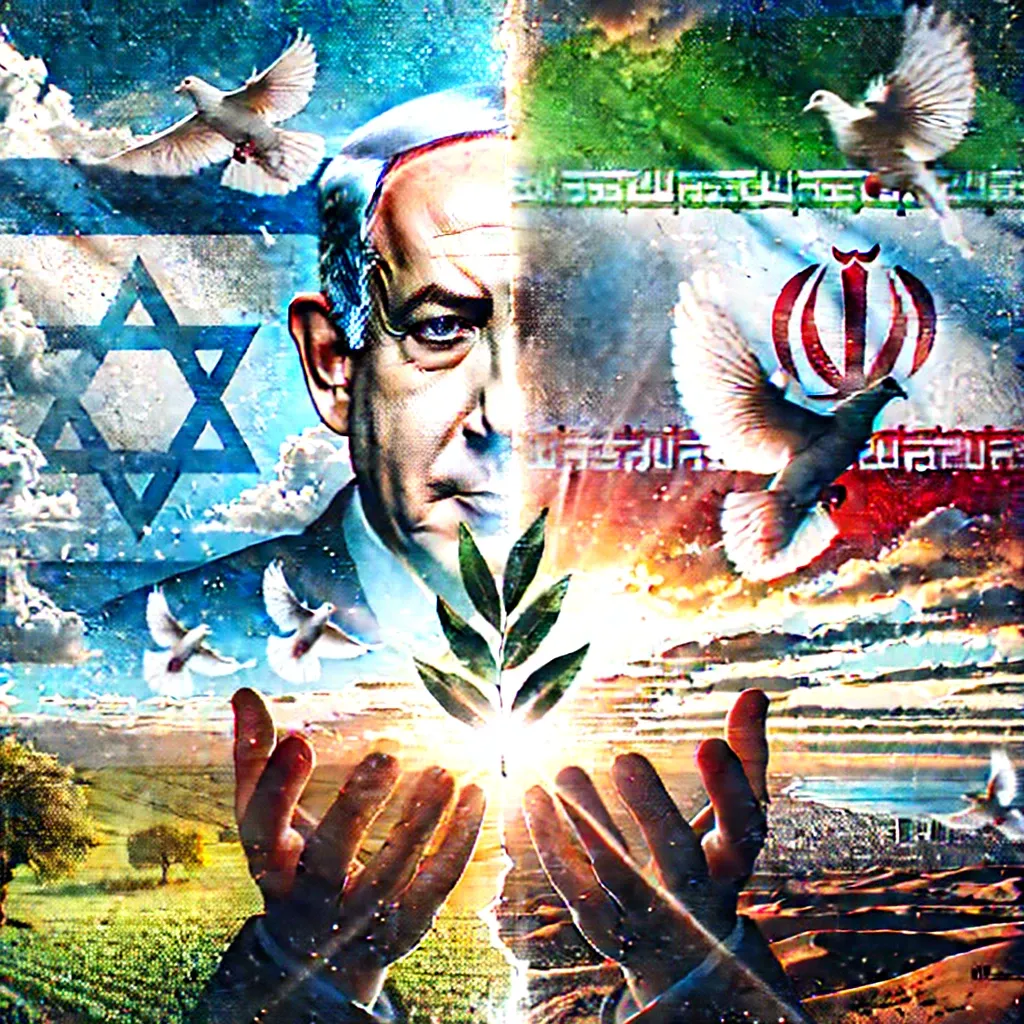

By Dr. Tim Orr
Exactly one year has passed since the devastating October 7th attacks, a day seared into the memory of the Middle East. In a live televised address just a week ago, Israeli Prime Minister Benjamin Netanyahu spoke directly to the Iranian people, offering them a glimpse of his vision for peace. His message was clear: Israel's fight is not with the people of Iran but with the oppressive regime that rules over them. Netanyahu emphasized that while the Iranian government fuels terror and instability across the region, the Iranian people deserve freedom and prosperity. Iran, a nation with a rich history, is tragically led by a wicked regime that sponsors terror and incites hatred, using groups like Hamas and Hezbollah as proxies to destabilize the region. In this article, we will delve into Netanyahu's vision for peace and how it contrasts sharply with the actions of Iran's leadership, highlighting the path forward for Israelis and Iranians alike.
In an unprecedented and deeply personal address, Israeli Prime Minister Benjamin Netanyahu took a bold step by directly speaking to the people of Iran, bypassing their leaders and traditional diplomatic channels. His speech significantly departed from the usual rhetoric between the two nations. Netanyahu spoke as a fellow human being, aiming to forge a connection with the Iranian people by highlighting their shared history, struggles, and potential for a future free from the oppressive theocracy that governs them.
The Tyranny of the Iranian Regime
At the heart of Netanyahu's message was a condemnation of Iran's ruling regime. This government has not only isolated the country but also subjugated its people under the guise of religious authority. His speech laid bare the stark contrast between the regime’s fiery rhetoric of defending Lebanon, Gaza, and other Middle Eastern causes and its blatant disregard for the well-being of its citizens.
Netanyahu noted that while the regime pours billions into fueling proxy wars and regional instability, ordinary Iranians continue to face worsening living conditions, economic hardship, and repression. He painted a picture of a government so entrenched in its survival that it prioritizes military ambitions and nuclear development over basic needs like healthcare, education, and infrastructure.
This point resonates deeply with many Iranians, particularly the younger generations, who have grown disillusioned with the promises of the revolution that brought the current regime to power. The regime’s continued focus on foreign conflicts and sectarianism has drained Iran of resources that could have been used to address domestic concerns, including rising poverty and unemployment. Netanyahu's speech mirrored these frustrations, emphasizing that most Iranians recognize that their leadership does not care about their future.
The Human Cost of the Regime’s Wars
Netanyahu’s critique of Iran’s leadership didn’t stop at their neglect of the Iranian people. He also addressed the larger geopolitical consequences of the regime’s actions. By funding and arming groups like Hezbollah in Lebanon, Hamas in Gaza, and various militias in Iraq and Syria, the Iranian regime has entangled itself in conflicts across the Middle East, perpetuating violence and destabilizing the region.
What was particularly striking in Netanyahu’s speech was his focus on the human cost of these wars—not just for the people of Israel, who face existential threats from Iran-backed militias, but for Iranians as well. He stressed that the regime’s puppets, its militant proxies, are ultimately doomed to failure and death, further driving home the message that Iran’s leadership is sacrificing both Iranian and regional lives for its hegemonic ambitions.
By pointing to the elimination of figures like Qassem Soleimani, Netanyahu reminded the Iranian people that Israel's security and technological superiority are unmatched in the region. Israel’s willingness and ability to neutralize threats anywhere in the Middle East sends a clear signal to Iran’s leadership: the path of war and conflict only leads to defeat.
A Shared History of Peace: Reconnecting the Persian and Jewish Peoples
In one of the most powerful and humanizing aspects of his speech, Netanyahu reached back into history to remind Iranians and the world of the long-standing relationship between the Persian and Jewish peoples. He invoked a shared cultural and historical memory from Cyrus the Great, who famously allowed Jews to return to Jerusalem and rebuild their Temple, to more recently, when Jewish and Persian civilizations coexisted in peace.
By referencing this ancient bond, Netanyahu sought to cut through the current hatred and remind Iranians that their true history with the Jewish people is one of cooperation, not conflict. This appeal to history was not simply nostalgic—it was strategic. Netanyahu implied that the enmity between Israel and Iran is a relatively recent development, fostered not by the people but by a regime that manipulates religious and political narratives to maintain power.
This historical connection also highlighted the possibility of a future reconciliation. Netanyahu’s vision of a post-regime Iran is one where the Persian and Jewish peoples could once again thrive as partners in peace, working together to bring prosperity to both nations. He emphasized that peace is not a distant fantasy but a real, attainable goal if Iranians can break free from the grip of their theocratic rulers.
The Promise of a Better Future
One of the most striking aspects of Netanyahu’s speech was his unwavering belief in a better future for Iran—a future free from theocratic oppression, marked by peace, prosperity, and global integration. Netanyahu predicted that the regime's fall would come sooner than expected and painted a vivid picture of what a post-theocratic Iran could become.
He spoke of Iran flourishing with economic growth, technological innovation, and global investment. With its rich cultural history and immense human capital, Iran could become a global powerhouse, no longer isolated by international sanctions or caught in the cycle of war. His words directly appealed to the aspirations of the Iranian people, particularly the younger generation, who dream of a future where they can live in freedom and prosperity.
Netanyahu contrasted this vision with the current reality of repression, poverty, and endless conflict. He called on Iranians to demand more from their leadership and refuse to let a small group of fanatic theocrats crush their hopes and dreams. This was not just a plea for regime change—it was an appeal to the Iranian people’s sense of dignity and self-worth.
Support Dr. Orr's work by Joining his Patreon Community.
Iran’s Role in Global Peace and Stability
Netanyahu’s message wasn’t just about Israel and Iran; it was about the broader implications of Iran’s regime on global peace and stability. He pointed out that the regime’s tentacles stretch far beyond the Middle East, with Iran building terror networks across five continents. He suggested that dismantling this regime would have a ripple effect across the globe, reducing terrorism and bringing greater stability to the world.
In this context, Netanyahu’s speech was not just an appeal to Iranians but a call to the international community to recognize the threat posed by Iran’s leadership. The speech framed the struggle against the Iranian regime not just as an Israeli concern but as a global issue—one where the future of peace in the Middle East is intricately tied to the future of the Iranian people themselves.
Conclusion: An Appeal to Shared Humanity
Netanyahu’s speech was much more than a typical political address; it directly appealed to the Iranian people’s shared humanity. He bypassed their leaders and spoke to their desires, frustrations, and dreams. By framing the regime as the obstacle to Iran’s success, Netanyahu positioned himself as an unlikely ally to the Iranian people’s struggle for a better life. His message was clear: the Iranian people deserve more than the regime offers them, and Israel stands with them in their quest for peace and prosperity.
Netanyahu’s vision of a future where Iranians and Israelis work together toward a common goal is a powerful counter-narrative in a region often torn apart by conflict. His speech was a reminder that, despite the current animosities, peace is always within reach—if only the people are willing to seize it. For the people of Iran, Netanyahu’s message was both a challenge and an invitation: a challenge to reject the status quo and an invitation to imagine a future of freedom, dignity, and peace.
Tim Orr is a scholar, Evangelical minister, conference speaker, and interfaith consultant with over 30 years of experience in cross-cultural ministry. He holds six degrees, including a master’s in Islamic studies from the Islamic College in London. Tim taught Religious Studies for 15 years at Indiana University Columbus and is now a Congregations and Polarization Project research associate at the Center for the Study of Religion and American Culture at Indiana University Indianapolis. He has spoken at universities, including Oxford University, the University of Tehran, and mosques throughout the U.K. His research focuses on American Evangelicalism, Islamic antisemitism, and Islamic feminism, and he has published widely, including articles in Islamic peer-reviewed journals and three books.
 YouTube
YouTube
Sign up for Dr. Tim Orr's Blog
Dr. Tim Orr isn't just your average academic—he's a passionate advocate for interreligious dialogue, a seasoned academic, and an ordained Evangelical minister with a unique vision.
No spam. Unsubscribe anytime.
